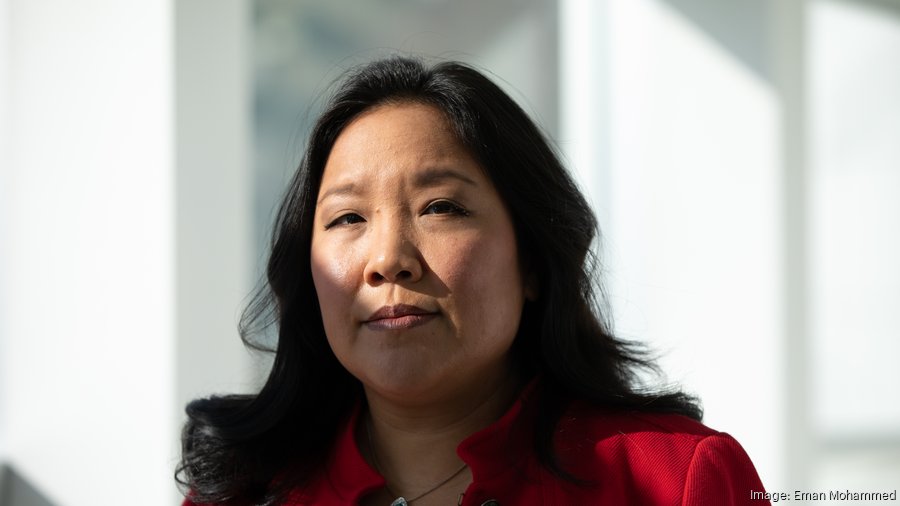Listen to this article 4 min
What will 2024 hold for business in Greater Washington? Not to be glib, but who the heck really knows? Uncertainty seems to still be floating through just about everything, from Metro’s budget to a certain upcoming election. And there’s no telling what kind of curveballs might come our way. A year ago, who would’ve thought the Wizards and Capitals would plan a move out of the District? But amid the haze, there are issues that stand out. Below, we take a look at the pressing issues facing our region’s businesses, from the commercial real estate death spiral and efforts for new hospitals to VC trends and the challenges facing the D.C.-area’s restaurant scene.
And in the gallery above, D.C.-area execs offer their predictions for the year.
Retail & Hospitality
Future of Chinatown
Edens CEO Jodie McLean and Deborah Ratner Salzberg, formerly of Forest City Washington, will head a new task force charged with coming up with a new vision for the Capital One Arena in downtown D.C. if Monumental Sports & Entertainment moves ahead with plans for a new sports arena at Potomac Yard in Alexandria. What happens next for the arena under that scenario could be a lifeline, or deathblow, for the surrounding area.
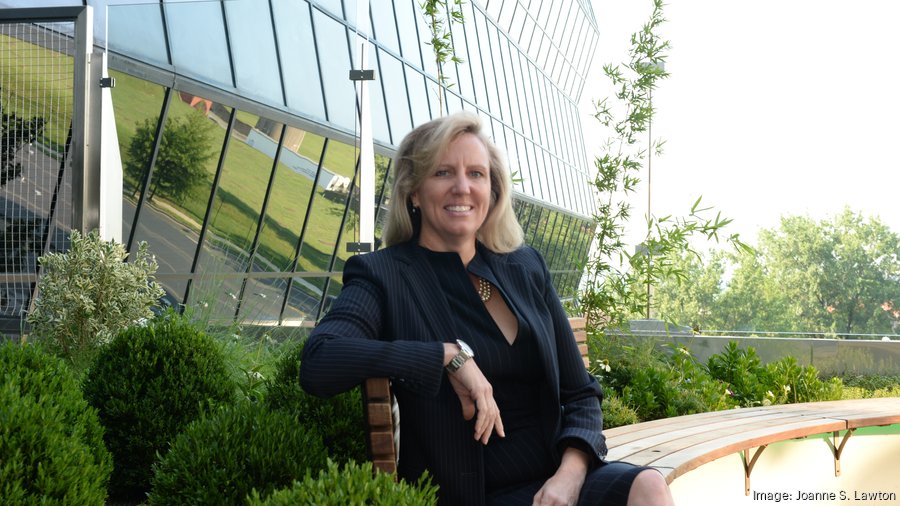
Choice and Wyndham
The hospitality industry is closely watching Patrick Pacious, president and CEO of North Bethesda’s Choice Hotels Inc. as it tries to complete its proposed hostile takeover of Wyndham Hotels & Resorts Inc. to become one of the largest budget hotel owners in the U.S. Wyndham has so far rebuffed his overtures, but the company in December made an “exchange offer” it hopes will win over shareholders at Wyndham’s annual meeting.
National Landing on the big stage
As head of retail leasing for JBG Smith, Amy Rice will play a key role in helping flush out the vision for a $2 billion entertainment district at Potomac Yard in Alexandria to be anchored by a new sports arena. The right selection of shops, restaurants and other entertainment uses could bolster Monumental Sports & Entertainment’s decision to move to Northern Virginia and increase the strength of the larger National Landing brand that also includes Amazon.com Inc.’s second headquarters and Virginia Tech’s innovation campus.
All the restaurant challenges
Shawn Townsend and the Restaurant Association Metropolitan Washington, which he leads, have a tough road ahead as they seek to support the region’s restaurant industry through challenges including the implementation of Initiative 82, which phases out the tipped wage credit for service workers, the stubbornly lower office occupancy rates, high crime and the prospect of the departure from downtown D.C. of the two of Washington’s major sports teams for a new venue in Northern Virginia.
Return of international travel
D.C.’s hospitality scene rebounded substantially from the worst of the Covid-19 pandemic, but one big part of the market, international travel, continued to lag. Destination D.C. estimates around 1.2 million international travelers, off from 1.8 million in 2019, though hospitality experts including Elliott Ferguson, head of the District’s lead marketing agency, hope to see those figures come up in the new year.
Redbrick’s major play
Thomas Skinner and Redbrick have been tapped to redevelop a portion of the Washington Navy Yard’s southeast D.C. campus as part of a larger land swap to result in a new National Museum of the United States Navy. The project promises to reanimate a lifeless part of the Navy’s waterfront campus and create stronger connections to both The Yards closer to Nationals Park and to underserved neighborhoods east of the Anacostia River, where Redbrick is working on other projects including the Bridge District.
— Daniel J. Sernovitz
Health & Life Sciences
Expansion time
Inova Health System is already a dominant player in Northern Virginia’s health care ecosystem, and it’s poised to get even larger as it prepares to break ground — at the same time — on new hospitals in Springfield and Alexandria. It’s not the only health system shelling out hundreds of millions to build bigger, more modern hospitals as existing facilities strain to accommodate explosive demand for care. Over in Southeast D.C., Cedar Hill Regional Medical Center is targeting a 2025 opening, so it will need to make significant headway in 2024 to bring its state-of-the-art facility to an area of the city where access to quality health care is sorely lacking. Meanwhile, Adventist HealthCare is solidifying plans to replace Fort Washington Medical Center in Prince George’s County while conceiving a replacement for Howard University Hospital, which it manages and could potentially acquire. Yet, for all their ambitions, these systems are running into challenges largely out of their control: rising interest rates and lingering supply chain issues. Indeed, several projects are already delayed and over budget, so we’ll be watching closely to see which ones stay on track and which ones fall behind.
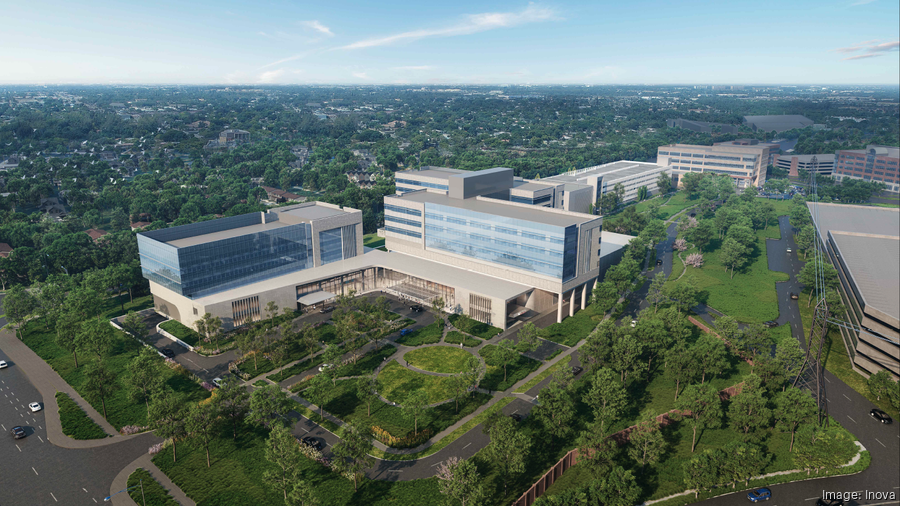
Changes at the top
We open 2024 with a handful of new leaders likely to effect big change in 2024. Michelle Riley-Brown is now at the top at Children’s National Hospital, where she’s the first new chief executive in 12 years, now taking stock of what’s what and evaluating priorities for the year and beyond. She’s not the only new health care leader in town: Israel Rocha recently took the reins of Kaiser Permanente of the Mid-Atlantic States and, now, is poised to lead the regional affiliate through a major growth period. Meanwhile, D.C. federally qualified health center Whitman-Walker Health System is searching for a new CEO, and in biotech land, Emergent BioSolutions is still searching for a permanent replacement for Bob Kramer, who abruptly resigned as CEO last summer.
Cannabis questions
Yes, cannabis is legal across D.C., Maryland and Virginia, but we still have so many questions about whether the industry can truly thrive here. Virginia has yet to create a marketplace for recreational sales, so we’ll be watching closely as pro-cannabis lawmakers press Republican Gov. Glenn Youngkin to sign off on legislation that would finally establish one. Meanwhile, Maryland is planning to award dozens of new cannabis business licenses — amid mounting concern that the marijuana market is becoming saturated. Then there’s D.C., which will need to find ways to advance cannabis sales even as it’s controlled by a federal government that still treats the drug as a banned substance. We’re eager to see what the city, which always seems to find novel ways around the federal ban, does next.
Labor fights loom
Health care’s chronic labor shortage and overburdened facilities will undoubtedly prompt more efforts by workers to unionize. It’s a hot moment for organizing across the country, and Greater Washington has already seen strikes and walkouts, and multiple efforts by clinical and nonclinical staff to ink new union contracts. The goal? Better working conditions, increased pay, more support for staff and equitable care for patients. Expect the unrest to continue in 2024.
What’s next for biotech?
For biotech, 2024 could be the year of the comeback. The D.C. metro’s life sciences economy suffered big cuts in 2023, as we witnessed several companies restructure — slashing headcounts and business lines to save money and refocus attention. Now some of those companies, like Silver Spring’s Elutia and maybe, just maybe, Novavax, appear poised for big years. Don’t be surprised, either, if companies that previously put IPO plans on hold — Immunomic Therapeutics and Sirnaomics among them — revive plans to go public.
— Sara Gilgore
Money & Technology
A rebound for bank M&A
Bank mergers have been few and far between these last couple of years, but the $371.5 million combination of Alexandria’s Burke & Herbert Financial Services Corp. and West Virginia’s Summit Financial Group, could be a sign that activity is poised to pick up. That deal — announced in August and expected to close in early 2024 — stalled multiple times during two years of negotiations, but Burke & Herbert CEO David Boyle remained persistent because, he said, community banks need to get larger “to stay relevant.” Moreover, organic growth is hard to come by at a time when elevated interest rates are crimping loan demand and raising deposit costs, which is why bankers and other experts are predicting an M&A resurgence in 2024.
Venture capital slump continues
Venture capital investment hit a nine-year low in the third quarter of 2023 in the D.C. area, in terms of the number of new deals inked. There were a handful of local announcements that caught our eye toward year’s end, but that doesn’t change the fact that there are fewer checks being signed. — PitchBook found about 38% of VCs practically stopped making new investments in the first nine months of 2023, because the market for mergers and acquisitions and initial public offerings — the primary ways startups generate returns for investors — has largely dried up. Until uncertainty in the economy lessens and exit activity picks up, expect many VC investors to remain on the sidelines.
Can new CEO right the ship at 2U?
Paul Lalljie stepped into the top job at the Lanham online learning company 2U Inc. in November and wasted little time shaking up leadership in a bid to flatten the organizational structure. Lalljie, 2U’s former CFO, replaced Chip Paucek, who despite drastically cutting costs by closing offices and laying off staff, struggled to stabilize the struggling compamy. Expect Lalljie to continue the belt-tightening, but to reverse 2U’s sagging fortunes — its shares lost about 92% of their value in 2023 — he’ll also need to find new sources of revenue and tackle what CNBC said in November was a “worrying” $880 million debt load.
What’s next for Urban One?
Another CEO facing a potentially pivotal year is Alfred Liggins of Silver Spring’s Urban One. The company hit a major bump in the road in November when a referendum to allow Urban One to build a casino in Richmond was voted down for the second time. Liggins, the second generation to head the legacy radio and TV company primarily targeting Black audiences, is determined to build gaming into a third line of business to match the size of its first two, though where and when remain open questions, given the cost and regulatory hurdles of building a casino. In the meantime, Liggins said he is keeping close tabs on internet gaming, which is now legal is seven states and is poised to become a $39 billion industry in the U.S. over the next decade by some estimates.
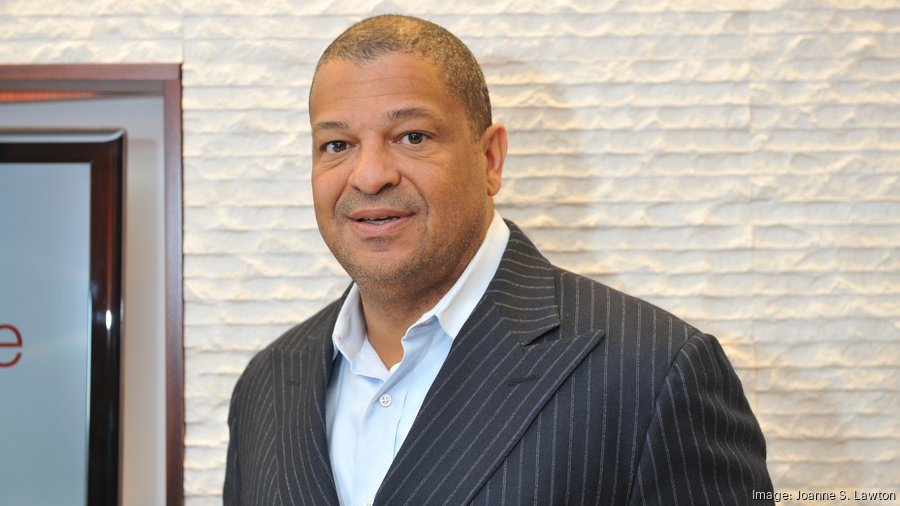
The future of regionalism: Not so bright
Local business leaders talk a good game about jurisdictions working together to improve Greater Washington’s business climate, but the reality is that D.C., suburban Maryland and Northern Virginia often work against each other. The recent announcement that Monumental Sports & Entertainment plans to move the Washington Wizards and Capitals from the District to a new complex in Alexandria has tensions running high between the jurisdictions, while political leaders in Virginia continue to cry foul over an FBI site selection process that landed the bureau’s new headquarters in Greenbelt — for now. Other efforts to draw the region together, such as a bid from dozens of regional partners to participate in a Biden administration program to build out hubs for hydrogen development, fell flat this year, and local jurisdictions aren’t exactly rushing to help Metro fill an anticipated $750 million shortfall. Groups like the Metropolitan Washington Council of Governments, the Greater Washington Partnership and Connected DMV, continue to champion regionalism, but they’ll clearly have their work cut out for them in 2024.
— Ana Lucía Murillo
Real Estate Inc.
Commanders stadium
The Washington Commanders’ FedEx Field obligations end in 2027. Yes, the team could continue to play in the deteriorating Landover stadium beyond that time, but we expect a decision on a new location to come in 2024 as Thad Sheely, the Commanders’ stadium adviser and former COO of the NBA’s Atlanta Hawks, narrows down potential locations. We’ve long known the franchise wants a huge new mixed-use stadium-and-entertainment-plex, but previous owner Dan Snyder’s poisonous reputation was standing in the way of D.C., Maryland and Virginia pitching big public financing lures. With Snyder now history, having sold the team for $6.05 billion last year to a group led by billionaire Josh Harris, look for public officials keener to open their public wallets, with D.C.’s RFK Stadium campus, Loudoun County’s Waterside and Landover remaining the most likely options.
Monumental arena
The top news of 2023 was Monumental Sports & Entertainment announcing plans to relocate the Capitals, Wizards and more from D.C. to a new $2 billion “entertainment district” in Potomac Yard. Whether the Virginia General Assembly and Alexandria City Council approve the proposed public financing apparatus and land use changes, respectively, on which the deal hinges will be top news in 2024. There’s a great deal of skepticism among both lawmakers, locally and not, and neighbors, but we should know by February, when the General Assembly session ends, whether the deal will advance.
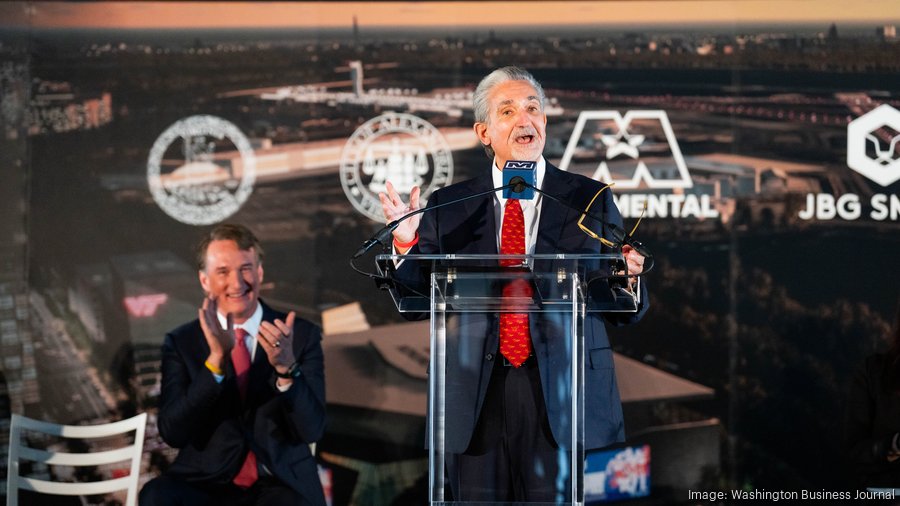
Metro budget
Despite being a major economic engine for the region, Greater Washington’s transit system is in dire financial straits. Federal bailout dollars that offset the Covid-induced loss of ridership and fare revenue have run out. And the Washington Metropolitan Area Transit Authority has struggled mightily to bring its riders back, especially with so many people now working hybrid schedules. Unless Metro’s contributing state and local governments come up with more money — a lot more — the only way for Metro to close the gap will be to slash services and personnel in its fiscal year 2025 budget.
FBI headquarters
Did anyone think the decision to put the FBI headquarters in Greenbelt would end this generation-long debate? Of course it hasn’t, but 2024 will be a key year for the project, as Maryland’s congressional delegation works to fight back Virginia’s opposition and land the funding to get work started on the FBI’s 7,500-person, $4.1 billion digs. In the end, though, all of it may be for naught, as former President Donald Trump, who is likely to represent the Republican Party in the upcoming November general election, has already declared he wants the FBI to remain in downtown D.C., in a new headquarters building.
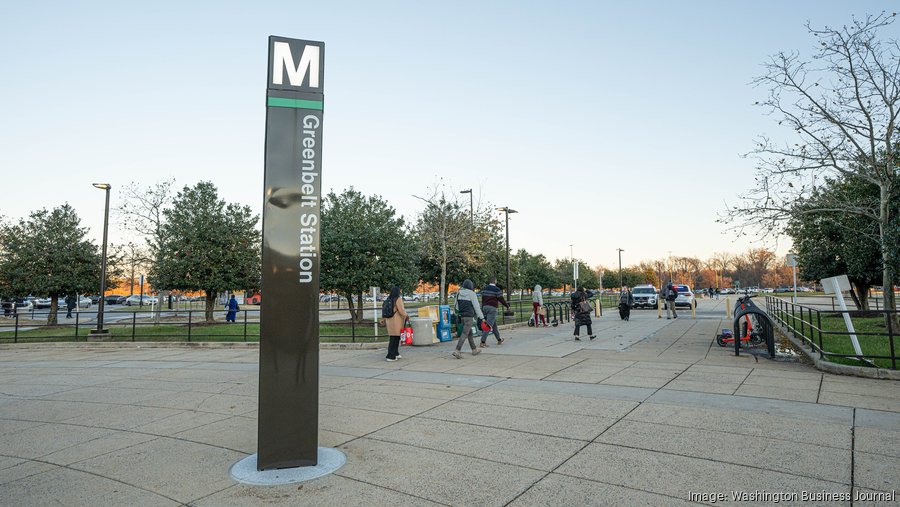
Virginia casino
This past fall saw a rumor — potent enough that the Reston Association, a membership organization, released a letter opposing it — that the owner of Reston Station wants to put to a casino there. Doing so would require enabling legislation from the state, along the lines of what two lawmakers proposed but withdrew during the last General Assembly session. Look for similar legislation to surface again, with Sen. David Marsden, D-Burke, as its leading sponsor. Casino proponents, led by Reston Station developer Comstock Holding Cos., have formed a political action committee, Building a Better Virginia, and raised hundreds of thousands of dollars for the cause. A casino in Fairfax County, whether at Reston Station or elsewhere, would represent major competition for MGM at National Harbor — expect that gaming giant to pour big resources into lobbying against such a development.
Loudoun data centers
Data center growth will continue to decelerate in Loudoun County, even while some other jurisdictions seek bigger slices of that extremely lucrative pie. In the run-up to Loudoun’s vote on a new zoning ordinance, which lawmakers recently adopted, industry leaders sent a letter warning supervisors that revisions they’d proposed along the way could “discourage any additional data center square footage that isn’t already approved.” That concern remains, which may ultimately cook Loudoun’s golden goose.
The office market
We still haven’t hit rock bottom. Somehow. Expect tepid sales and a dearth of new development, and what’s likely to be a continuing roll of buildings, largely older properties, falling into financial distress — especially as more office tenants, including the feds, turn away from big leases in the age of hybrid work. As we turned the page on a new year, multiple D.C., Northern Virginia and suburban Maryland office properties have already sold for a fraction of what they last traded for. The District’s budget, and its downtown, are taking the brunt of the impact. Further weakening of the commercial real estate sector “poses a real threat to the local economy and property tax revenues,” D.C. Chief Financial Officer Glen Lee wrote in his revised revenue estimates, released Dec. 29.
Riverfront rising
The 11th Street Bridge Park. The Douglass at Anacostia’s Bridge District. Poplar Point, finally. A new U.S. Navy museum. What do these projects — some long envisioned, others newly proposed — have in common? They all sit along the Anacostia River waterfront, and are all expected to advance in 2024. This will be a big year for the Anacostia, as developers turn their attention from the Potomac River and the Washington Channel to the southeast. It is the next riverfront frontier.
— Dan Brendel & Tristan Navera
